英语发展史thehistoryofEnglish
关于英语的发展史的英文原版书籍
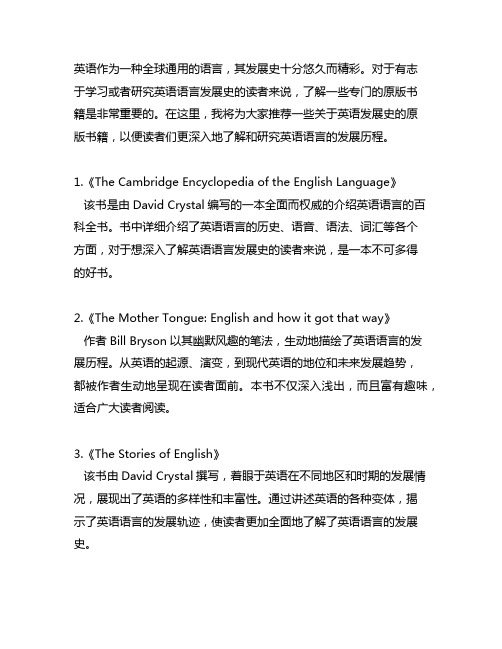
英语作为一种全球通用的语言,其发展史十分悠久而精彩。
对于有志于学习或者研究英语语言发展史的读者来说,了解一些专门的原版书籍是非常重要的。
在这里,我将为大家推荐一些关于英语发展史的原版书籍,以便读者们更深入地了解和研究英语语言的发展历程。
1.《The Cambridge Encyclopedia of the English Language》该书是由David Crystal编写的一本全面而权威的介绍英语语言的百科全书。
书中详细介绍了英语语言的历史、语音、语法、词汇等各个方面,对于想深入了解英语语言发展史的读者来说,是一本不可多得的好书。
2.《The Mother Tongue: English and how it got that way》作者Bill Bryson以其幽默风趣的笔法,生动地描绘了英语语言的发展历程。
从英语的起源、演变,到现代英语的地位和未来发展趋势,都被作者生动地呈现在读者面前。
本书不仅深入浅出,而且富有趣味,适合广大读者阅读。
3.《The Stories of English》该书由David Crystal撰写,着眼于英语在不同地区和时期的发展情况,展现出了英语的多样性和丰富性。
通过讲述英语的各种变体,揭示了英语语言的发展轨迹,使读者更加全面地了解了英语语言的发展史。
4.《The History of English: A Linguistic Introduction》该书由Scott Shay编写,是一本专门介绍英语语言历史的语言学专著。
作者通过分析英语的词汇、语法、语音等方面,构建了一幅完整的英语语言发展史的图景,对于专业研究英语语言的学者和学生来说,是一部必备的参考书。
5.《The English Language: A Historical Introduction》该书由Charles Barber、Joan Beal和Philip Shaw合著,全面系统地介绍了英语语言历史的方方面面。
英语发展史 the history of English PPT课件
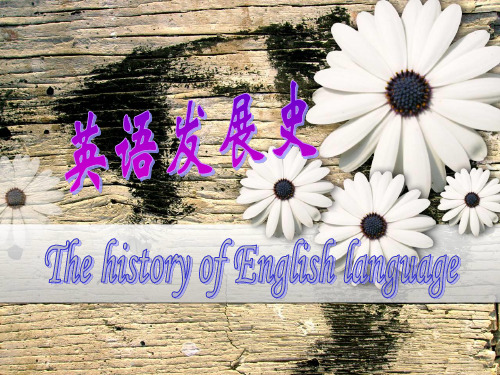
thanks
由此产生的许多短语一直保留到现在,如
night and main, friend or foe, a labour of love。
(公元1100—1500年)
In 1066, the Normans conquered
1066 14
England. French became the
存并很语 象语
了。在复合词的构成格式方面,也吸收 了法语的一些特色,例如:名词+形容词, 副词+过去分词(例by-gone)。这些现象, 语言学史上称为英语的罗曼语化。这就
是为什么从谱系关系上看,英语与德语
同族,但现代英语的词汇和法语更相近 的原因。
大量的法语词的涌入,也使英语词
汇起了词义变化。有一些英语固有
的词被淘汰掉了,有一些虽然还存
(1500-- )
早期现代英语时期,对英语词汇的影响最大的是文艺复兴 运动。文专职复兴运动是十四世纪在意大利开始的,在十 六世纪以后的两个世纪内对英国的影响很大。在这一时期, 强调研究古代希腊、罗马文化,以对抗中世纪的封建文化。 于是许多外来词,主要是拉丁语和希腊语的词语传入英语, 成为英语的书面语和术语词的基本部分。同时也为英语提 供了大量的同义词。希腊和拉丁语词进入英语后有的保留 了原来的形式,如 climax, appendix, exterior, axis;有 的失去了词尾,如(扩号内为拉丁语), consult (consultare), exclusion (exclusioneum) exotic (exoticus); 还有的改变了词尾,使之更适合英语的形式,如形容词词 尾us 变成了ous或变成al,名词词尾tas变为ty。
英译汉
在8世纪末,斯堪的那维亚人攻占英国。 战 争持续了将近200年。 在这个时期,很多 拉丁语、丹麦和古斯堪的那维亚的单词融入
the history of English language英语语言发展历史

The industrial revolution
History of the English Language
•
The history of the English language really started with the arrival of three Germanic tribes who invaded Britain during the 5th century AD. These tribes, the Angles, the Saxons and the Jutes, crossed the North Sea from what today is Denmark and northern Germany. At that time the inhabitants of Britain spoke a Celtic language. But most of the Celtic speakers were pushed west and north by the invaders - mainly into what is now Wales, Scotland and Ireland. The Angles came from Englaland and their language was called Englisc - from which the words England and English are derived. • 英语真正的历史应该从公元5世纪时入侵英国的三个日耳曼部 落说起. 这几个部落分别是, 盎格鲁人, 撒克逊人,和朱特人,他 们从今天的德国北部和丹麦出发,然后横渡北海。那时候英国 的本地居民都说凯尔特语。但由于入侵者的逼迫,他们都被赶 到了西部和北部-主要是现在的威尔士,苏格兰和爱尔兰。盎格 鲁人来自 Englaland 他们的语言称为 Englisc (古英语) - 这两个 词就是现在England和English的前身。
英语发展史
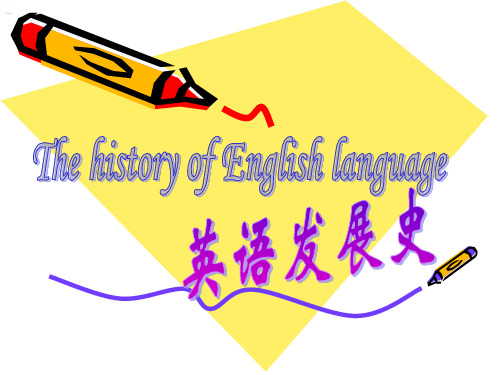
英 译 汉
在8世纪末,斯堪的那维亚人攻占英国。 战 争持续了将近200年。 在这个时期,很多 拉丁语、丹麦和古斯堪的那维亚的单词融入 英语。象炊具和杯子与生活息息相关一样, 拉丁语给了英语很多单词。从丹麦语和古斯 堪的那维亚语中,英国人借鉴过来了皮肤、 腿、以及各种词格的代词"他们"、"他们的"。 来自古斯堪的那维亚语的很多同义词统一到 英语中,例如,愤怒(英语的wrath和古斯堪 的那维亚语的anger);生病(英语的sick和古 斯堪的那维亚语的ill),都在英语中进行了统 一。
大量的法语词的涌入,也使英 语词汇起了词义变化。有一些英语 固有的词被淘汰掉了,有一些虽然 还存在,但词义范围有所改变,或 者带上特有的文体色彩和感情色彩。 例如:wed在古英语中作“结婚”解, 但在中古英语时期传入了法语 词”merry”,英语中“结婚”这一 意义渐渐由marry来表示,wed只用 在引申意义中了;它的动名词 wedding还是一个常用的词,但只限 于指“婚礼”。带有不同文体意义 的பைடு நூலகம்语本族语词与法语并存,组成 了英语中特有的同义词群格式。
The language historian divides English history into three times:
1、Ancient English
(又称盎格鲁-萨克森时期公元450—1100年)
The history of the English language began over 1500 years ago in the north of Europe. Around the fifth century A.D., tribes of people known as the Angels, Saxons, and Jutes traveled west from Germany and Denmark across the North Sea. They settled in Britain, and by the late seventh century, they were speaking an early form of the English.
英语的发展史(中英文版)
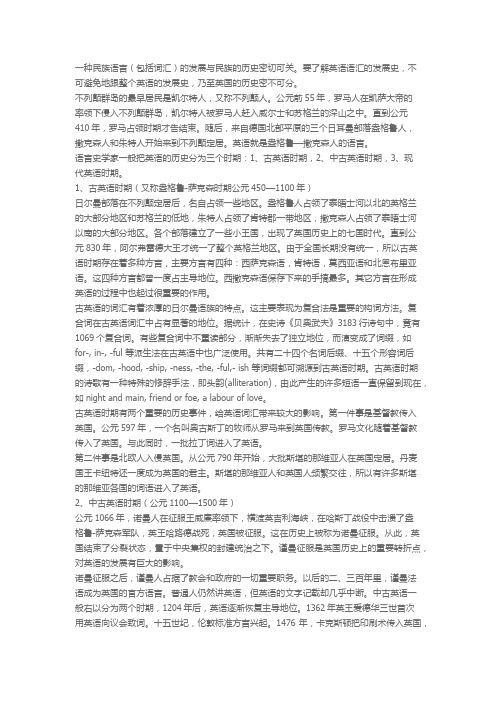
一种民族语言(包括词汇)的发展与民族的历史密切可关。
要了解英语语汇的发展史,不可避免地跟整个英语的发展史,乃至英国的历史密不可分。
不列颠群岛的最早居民是凯尔特人,又称不列颠人。
公元前55年,罗马人在凯萨大帝的率领下侵入不列颠群岛,凯尔特人被罗马人赶入威尔士和苏格兰的深山之中。
直到公元410年,罗马占领时期才告结束。
随后,来自德国北部平原的三个日耳曼部落盎格鲁人,撒克森人和朱特人开始来到不列颠定居。
英语就是盎格鲁—撒克森人的语言。
语言史学家一般把英语的历史分为三个时期:1、古英语时期,2、中古英语时期,3、现代英语时期。
1、古英语时期(又称盎格鲁-萨克森时期公元450—1100年)日尔曼部落在不列颠定居后,名自占领一些地区。
盎格鲁人占领了泰晤士河以北的英格兰的大部分地区和苏格兰的低地,朱特人占领了肯特郡一带地区,撒克森人占领了泰晤士河以南的大部分地区。
各个部落建立了一些小王国,出现了英国历史上的七国时代。
直到公元830年,阿尔弗雷德大王才统一了整个英格兰地区。
由于全国长期没有统一,所以古英语时期存在着多种方言,主要方言有四种:西萨克森语,肯特语,莫西亚语和北恩布里亚语。
这四种方言都曾一度占主导地位。
西撒克森语保存下来的手搞最多。
其它方言在形成英语的过程中也起过很重要的作用。
古英语的词汇有着浓厚的日尔曼语族的特点。
这主要表现为复合法是重要的构词方法。
复合词在古英语词汇中占有显著的地位。
据统计,在史诗《贝奥武夫》3183行诗句中,竟有1069个复合词。
有些复合词中不重读部分,渐渐失去了独立地位,而演变成了词缀,如for-, in-, -ful 等派生法在古英语中也广泛使用。
共有二十四个名词后缀、十五个形容词后缀,-dom, -hood, -ship, -ness, -the, -ful,- ish 等词缀都可溯源到古英语时期。
古英语时期的诗歌有一种特殊的修辞手法,即头韵(alliteration),由此产生的许多短语一直保留到现在,如night and main, friend or foe, a labour of love。
The history of English 英语的起源和发展(共14张PPT )

2.词根+后缀:acter
词根
后缀
前缀
3.前缀+词根:dislike 4. 前 缀 + 词 根 + 后 缀 : disablement
Hale Waihona Puke 单词记忆法1.仿声记忆法(外来词的收集)
romance(浪漫史), typhoon(台风), microphone(麦克风), copy(拷 贝), cartoon(卡通), sofa(沙发),tofu(豆腐)...
Sandwich——由英国伯爵山威奇(Sanwich)的名字而产生。为了打牌方便,他发明了一种可
以边玩牌边吃的夹心面包,发展到后来就成了今天的“三明治”。
6.对应法
譬如,当我们记忆father(父亲)一词时,可同时联想与其相对应的同一类女性名词mother
(母亲)。这样对应记忆单词可同时记住两个词,从而使记忆单词的效率提高一倍。
4.词缀记忆法
即遇到某一词缀时,尽可能扩充已学过或与之有关的词,较适用于复习旧词。
re-retell, reread, rewrite, redo, return, rebuilad...
un-unable, unacceptable, unattractive...
单词记忆法
5.典故和背景知识法
2.谐音记忆法
即利用英语单词的读音与汉语拼音相似的特点进行联系,想象记忆。如
tomb(坟墓)“土墓”
trainer(训练人)“捶哪”...
3.分析构词法
president——前缀pre(前)+sid(联想sit)+ent(人),“在前面就坐的人” 即“总统”)
international——前缀inter(相互)+nation(国家)+al(形容词后缀)=国际 的
纪录片 英语发展史 字幕

纪录片英语发展史字幕英文回答:The history of English documentary films is afascinating journey that showcases the evolution and development of the medium. From its early beginnings in the late 19th century to the present day, English documentaries have played a significant role in capturing real-life events, exploring social issues, and providing a platformfor storytelling.One of the earliest examples of English documentaryfilms is "Nanook of the North" (1922), directed by Robert J. Flaherty. This groundbreaking film depicted the life of an Inuit family in the Canadian Arctic and introduced the concept of the documentary as a form of storytelling. It showcased the challenges faced by the Inuit community and shed light on their way of life, making it a compelling and educational experience for viewers.Another notable milestone in the history of English documentary films is the emergence of the British Documentary Movement in the 1930s. Filmmakers such as John Grierson and Humphrey Jennings pioneered a new approach to documentary filmmaking, focusing on social issues and advocating for social change. Films like "Night Mail" (1936) and "Listen to Britain" (1942) captured the spirit of the times and provided a voice for the working class, highlighting their struggles and aspirations.In the post-war era, English documentary filmscontinued to evolve, reflecting the changing social and political landscape. The 1960s and 1970s witnessed a surgein observational documentaries, where filmmakers like Frederick Wiseman and Albert and David Maysles adopted afly-on-the-wall approach to capture real-life situations. Films like "Titicut Follies" (1967) and "Grey Gardens" (1975) offered an unfiltered glimpse into the lives of individuals in institutional settings, challenging societal norms and raising awareness about important issues.The advent of digital technology in the late 20thcentury revolutionized the documentary filmmaking process.It made filmmaking more accessible and allowed filmmakersto experiment with new storytelling techniques. For example, Michael Moore's "Bowling for Columbine" (2002) used a blend of interviews, archival footage, and personal narration to explore the causes and consequences of the 1999 massacre at Columbine High School. This film not only entertained and informed audiences but also sparked a nationwide debate on gun control in the United States.In recent years, English documentary films have embraced a wide range of subjects and styles. From environmental documentaries like "An Inconvenient Truth" (2006) to true crime series like "Making a Murderer" (2015), the genre has expanded to cater to diverse interests and tastes. Documentaries have also found a new home on streaming platforms like Netflix and Amazon Prime, reaching a global audience and further blurring the lines between traditional filmmaking and television.中文回答:英语纪录片的发展史是一段迷人的旅程,展示了这一媒介的演变和发展。
(完整版)英语的发展史(中英文版)
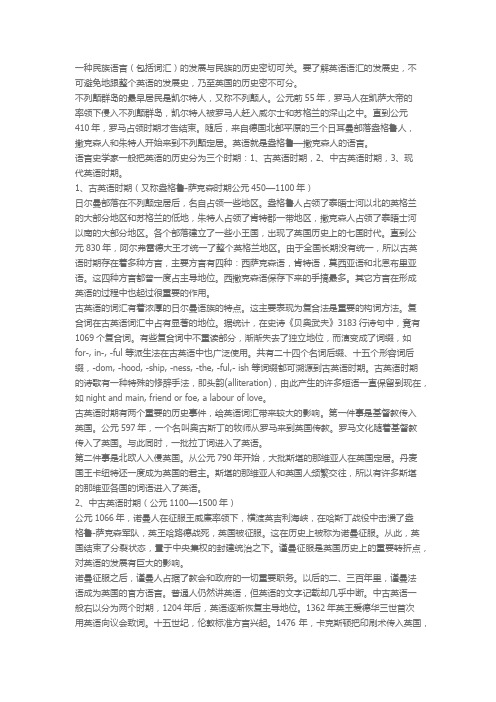
一种民族语言(包括词汇)的发展与民族的历史密切可关。
要了解英语语汇的发展史,不可避免地跟整个英语的发展史,乃至英国的历史密不可分。
不列颠群岛的最早居民是凯尔特人,又称不列颠人。
公元前55年,罗马人在凯萨大帝的率领下侵入不列颠群岛,凯尔特人被罗马人赶入威尔士和苏格兰的深山之中。
直到公元410年,罗马占领时期才告结束。
随后,来自德国北部平原的三个日耳曼部落盎格鲁人,撒克森人和朱特人开始来到不列颠定居。
英语就是盎格鲁—撒克森人的语言。
语言史学家一般把英语的历史分为三个时期:1、古英语时期,2、中古英语时期,3、现代英语时期。
1、古英语时期(又称盎格鲁-萨克森时期公元450—1100年)日尔曼部落在不列颠定居后,名自占领一些地区。
盎格鲁人占领了泰晤士河以北的英格兰的大部分地区和苏格兰的低地,朱特人占领了肯特郡一带地区,撒克森人占领了泰晤士河以南的大部分地区。
各个部落建立了一些小王国,出现了英国历史上的七国时代。
直到公元830年,阿尔弗雷德大王才统一了整个英格兰地区。
由于全国长期没有统一,所以古英语时期存在着多种方言,主要方言有四种:西萨克森语,肯特语,莫西亚语和北恩布里亚语。
这四种方言都曾一度占主导地位。
西撒克森语保存下来的手搞最多。
其它方言在形成英语的过程中也起过很重要的作用。
古英语的词汇有着浓厚的日尔曼语族的特点。
这主要表现为复合法是重要的构词方法。
复合词在古英语词汇中占有显著的地位。
据统计,在史诗《贝奥武夫》3183行诗句中,竟有1069个复合词。
有些复合词中不重读部分,渐渐失去了独立地位,而演变成了词缀,如for-, in-, -ful 等派生法在古英语中也广泛使用。
共有二十四个名词后缀、十五个形容词后缀,-dom, -hood, -ship, -ness, -the, -ful,- ish 等词缀都可溯源到古英语时期。
古英语时期的诗歌有一种特殊的修辞手法,即头韵(alliteration),由此产生的许多短语一直保留到现在,如night and main, friend or foe, a labour of love。
英语的形成与发展介绍(中英双语)PPT
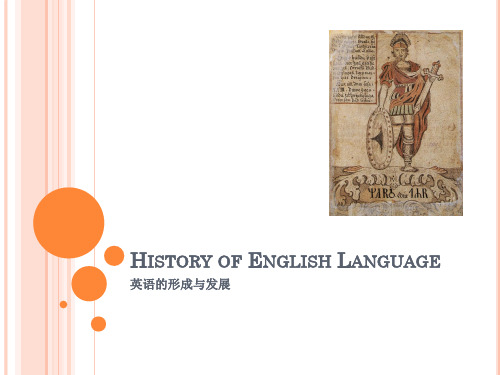
OLD ENGLISH (450 - 1100 AD):
Around 878 AD Danes and Norsemen, also called Vikings, invaded the country and English got many Norse words into the language, particularly in the north of England. The Vikings,
Some, such as church, bishop, baptism, monk, eucharist and presbyter came indirectly through
Latin from the Greek.
597年圣奥古斯丁的到来以及基督教传入撒克逊英格 兰,使更多的拉丁语单词进入英语。他们主要关注 教会政要的命名、仪式等。一些,如教堂、主教、 洗礼、僧侣、圣餐和长老会,间接通过拉丁语从希 腊语传来。
OLD ENGLISH (450 - 1100 AD):
The influence of Celtic upon Old English was slight. In fact, very few Celtic words have lived on in the English language. But many of place
English poem and it is notable for its length -
3,183 lines. Experts say "Beowulf" was written in
Britain more than one thousand years ago. The name of the person who wrote it is unknown.
英语发展史 history of english development

迁徙 Indo-European(印欧原始语)
5000BC---3000BC 黑海以北(今天的乌克兰、罗马尼亚等):住着 原始印欧民族。 3000BC后:开始迁徙。 南到印度,西到西欧,北到北欧等 证据:早在1786年英国梵文学者威廉· 琼斯爵士 (William Jones)发表了他在语言学领域里的惊 人的发现:梵文Sanskrit 和希腊语Greek、拉丁 语Latin是同源的。这三种语言都是从原始的印欧 语演变来的。
征服2 基督教 (Christianity)
公元597年
一个名叫奥古斯丁的牧师从罗马来到英国传 教。罗马文化随着基督教传入了英国。与 此同时,一批拉丁词(Latin words)进入了 英语。
征服3 丹麦(Denmark)
The
9th century 英国又遭到斯堪的纳维亚人Scandinavian 的大规模的侵袭。整个公元十世纪,丹麦 人(the Danish)不断入侵;公元十一世纪, 丹麦国王实际上统治着英国。由于北欧人 的入侵,大量的斯堪的纳维亚语词进入了 英语词 汇。历史书上把这次侵略称为丹麦 征服。
征服 5 文艺复兴(the Renaissance)
文艺复兴时期,由于人文主义者热衷研究
古希腊、古罗马文明,大量拉丁语和希腊 语的单词进入英语。 其实,在法国统治期间(1066后),拉丁 语就是仅次于法语的语言,所有的宗教活 动都使用的是拉丁语。
希腊语对英语词汇的影响
古希腊文明
(500BC---100AD)与希腊语 荷马史诗Iliad & Odyssey (《伊利亚特》& 《奥德赛》)
灭亡后(476),拉丁语分化成意大利语、 葡萄牙语、西班牙语、法语等。所以拉丁 语是欧洲历史上最重要的语言,既是高级 文化的古典语言,又是罗曼语族的祖先。 英语词汇的一半以上是拉丁词源,要么直 接从拉丁语借用,要么从法语中借用。
英语的发展史

English history about the development is divided into four periods. 英语的发展历史大约分为四个时期
First period was the origin of English. 第一个时期是英语的起源 Followed by the emergence and development of core English vocabulary. 其次是核心英语词汇的产生和发展 Then there is English improvement. 接下来就是英语的日趋完善 Last is the development of modern English. 最后是当代英语的发展
Around 1476 William Caxton set up a printing press in England and started a communications revolution. Printing brought into English the wealth of new thinking that sprang from the European Renaissance. Translations of Greek and Roman classics were poured onto the printed page, and with them thousands of Latin words like capsule and habitual, and Greek words Latin and thermometer. Today we still borrow from Latin and Greek to name new inventions, like video, television and cyberspace. 大约在1476年,威廉.卡克斯顿在英国制造了一台应刷机,由 此掀开了一场信息传播技术的革命。印刷术把欧洲文艺复兴 运动中涌现的大量思想传入英国。希腊罗马经典著作的译文 纷纷印成书册,成千上万的拉丁词,如capsule (航天舱)和 habitual(惯常的),希腊词,如catastrophe (大灾难)和 thermometer(温度计)等也随之涌入。今天我们任然借用拉 丁、希腊语命名新的发明创造,如video、television和 cyberspace.(虚拟空间)等。
英语语言的发展史

• The Roman Occupation(55 B.C.- 410 ) -- 55 B.C., Roman invasion of Britain by Julius Caesar (尤里乌斯· 凯撒) -- 43 B.C., Roman invasion and occupation. Beginning of Roman rule of Britain . -- 410 A.D., Roman power in Britain collapsed. -- 436 A.D., Roman withdrawal from Britain complete. (Textbook 7th para.)
• 特别是法语,由于与英国一直保持着密切 关系,法语词仍然源源不断地传入英语。 • 1660年英国王朝复辟, 社会风气十分奢靡, 王室贵族崇尚法国文化, 以说法语为时髦风 雅, 大批军事、外交、艺术、饮食方面的词 汇被英国吸收。如: government, empire, royal, majesty, duke, painting, ballet , cartoon, fry, beef, painting, ballet cartoon 等.
英语发展史 the history of English
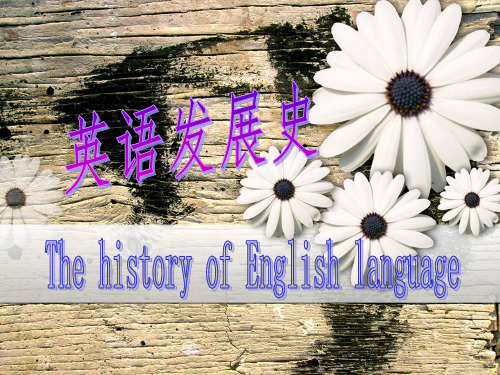
In the late eighth century, the Vikings attacked England. Fighting continued for years. During this time, almost two hundred many Latin, Danish, and Norse words entered the English language. Latin gave English words like kitchen and cup. From Danish and Norse, English borrowed skin, leg, they. many synonyms from the Norse language became integrated into English, for example, wrath(English),anger(Norse);sick(English),i ll(Norse).
古英语的词汇有着浓厚的日尔曼语族的特点。这主
要表现为复合法是重要的构词方法。复合词在古英
语词汇中占有显著的地位。据统计,在史诗《贝奥 武夫》3183行诗句中,竟有1069个复合词。有些复 合词中不重读部分,渐渐失去了独立地位,而演变 成了词缀,如for-, in-, -ful 等派生法在古英语中也 广泛使用。共有二十四个名词后缀、十五个形容词 后缀,-dom, -hood, -ship, -ness, -the, -ful,- ish 等词缀都可溯源到古英语时期。古英语时期的诗歌 有一种特殊的修辞手法,即头韵(alliteration),
10分钟英语发展史

10-Minute History of English DevelopmentEnglish, one of the most widely spoken languages globally, has a rich and fascinating history spanning over a thousand years. In just 10 minutes, let's explore the highlights of its development.The origins of English can be traced back to the 5th century, when the Angles, Saxons, and Jutes invaded Britain, bringing their Germanic languages. Over time, these languages merged and evolved into Old English, which was heavily influenced by Latin and Norse due to trade and invasions.By the 11th century, Norman invasion under William the Conqueror marked a significant turning point. French became the language of the ruling class, while English persisted among the commoners. This period saw the emergence of Middle English, which saw the influence of French vocabulary and grammar.The 14th century brought the Black Death, which decimated Europe's population, leading to a simplification of the language as the commoners, now a larger portion of society, influenced its vocabulary and grammar. This simplification marked the transition to Modern English.The Renaissance period saw a surge in literacy, and with the printing press, English literature flourished. Shakespeare's works, in particular, showcased the richness and diversity of the language.The Industrial Revolution in the 18th century further transformed English, as it became the language of global trade and empire. This led to the incorporation of words from various languages, expanding its vocabulary and making English more inclusive.Today, English is a global language, spoken by millions around the world. Its adaptability and inclusivity have made it a bridge between cultures, facilitating communication and understanding.英语作为全球最广泛使用的语言之一,拥有丰富而迷人的历史,跨越了千余年。
(完整版)英语的发展史(中英文版)

一种民族语言(包括词汇)的发展与民族的历史密切可关。
要了解英语语汇的发展史,不可避免地跟整个英语的发展史,乃至英国的历史密不可分。
不列颠群岛的最早居民是凯尔特人,又称不列颠人。
公元前55年,罗马人在凯萨大帝的率领下侵入不列颠群岛,凯尔特人被罗马人赶入威尔士和苏格兰的深山之中。
直到公元410年,罗马占领时期才告结束。
随后,来自德国北部平原的三个日耳曼部落盎格鲁人,撒克森人和朱特人开始来到不列颠定居。
英语就是盎格鲁—撒克森人的语言。
语言史学家一般把英语的历史分为三个时期:1、古英语时期,2、中古英语时期,3、现代英语时期。
1、古英语时期(又称盎格鲁-萨克森时期公元450—1100年)日尔曼部落在不列颠定居后,名自占领一些地区。
盎格鲁人占领了泰晤士河以北的英格兰的大部分地区和苏格兰的低地,朱特人占领了肯特郡一带地区,撒克森人占领了泰晤士河以南的大部分地区。
各个部落建立了一些小王国,出现了英国历史上的七国时代。
直到公元830年,阿尔弗雷德大王才统一了整个英格兰地区。
由于全国长期没有统一,所以古英语时期存在着多种方言,主要方言有四种:西萨克森语,肯特语,莫西亚语和北恩布里亚语。
这四种方言都曾一度占主导地位。
西撒克森语保存下来的手搞最多。
其它方言在形成英语的过程中也起过很重要的作用。
古英语的词汇有着浓厚的日尔曼语族的特点。
这主要表现为复合法是重要的构词方法。
复合词在古英语词汇中占有显著的地位。
据统计,在史诗《贝奥武夫》3183行诗句中,竟有1069个复合词。
有些复合词中不重读部分,渐渐失去了独立地位,而演变成了词缀,如for-, in-, -ful 等派生法在古英语中也广泛使用。
共有二十四个名词后缀、十五个形容词后缀,-dom, -hood, -ship, -ness, -the, -ful,- ish 等词缀都可溯源到古英语时期。
古英语时期的诗歌有一种特殊的修辞手法,即头韵(alliteration),由此产生的许多短语一直保留到现在,如night and main, friend or foe, a labour of love。
英语的发展历程
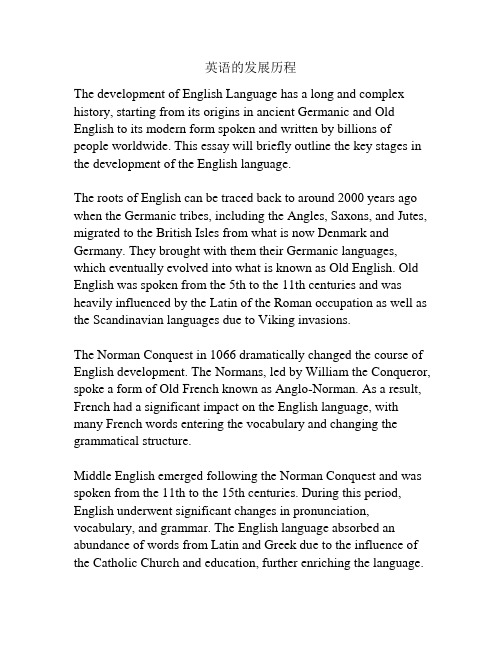
英语的发展历程The development of English Language has a long and complex history, starting from its origins in ancient Germanic and Old English to its modern form spoken and written by billions of people worldwide. This essay will briefly outline the key stages in the development of the English language.The roots of English can be traced back to around 2000 years ago when the Germanic tribes, including the Angles, Saxons, and Jutes, migrated to the British Isles from what is now Denmark and Germany. They brought with them their Germanic languages, which eventually evolved into what is known as Old English. Old English was spoken from the 5th to the 11th centuries and was heavily influenced by the Latin of the Roman occupation as well as the Scandinavian languages due to Viking invasions.The Norman Conquest in 1066 dramatically changed the course of English development. The Normans, led by William the Conqueror, spoke a form of Old French known as Anglo-Norman. As a result, French had a significant impact on the English language, with many French words entering the vocabulary and changing the grammatical structure.Middle English emerged following the Norman Conquest and was spoken from the 11th to the 15th centuries. During this period, English underwent significant changes in pronunciation, vocabulary, and grammar. The English language absorbed an abundance of words from Latin and Greek due to the influence of the Catholic Church and education, further enriching the language.The invention of the printing press by William Caxton in the late 15th century marked another milestone in the development of English. Printed books became more accessible to the general population, contributing to the standardization of English spelling and grammar. The Great Vowel Shift, a major phonological change in the English language, also occurred during this period, shaping the pronunciation of many words that we still use today. The voyages and exploration of the British Empire from the 16thto the 19th centuries brought English to different parts of the world and influenced its global spread. The colonization of America, Australia, and many parts of Africa and Asia led to the emergence of different varieties of English, known as dialects or accents. These varieties developed their own unique characteristics influenced by the local languages and cultures.In the 20th century, with the rise of technology and communication, English became the world's dominant language in trade, international relations, and science. This global influence contributed to the standardization of English through organizations such as the Oxford English Dictionary and the formation of institutions like the British Council and the English Language Teaching Association.However, it is important to note that the development of English is an ongoing process. New words are constantly being added to the vocabulary due to cultural changes, technological advancements, and globalization. English has become a lingua franca, a language used for communication between people who do not share a common native language.In conclusion, the development of English language spans over centuries and has gone through several significant stages. From its Germanic roots to its global dominance, English has evolved and adapted to the changing world around it. As the language continues to connect people around the globe, it will undoubtedly continue to change and develop in the future.。
The Development of English英语发展的历史

The Development of EnglishEnglish is a language that is widely used all over the world, and English as a language has developed through history, and it has changed from its basic origins, when it was referred to as 'Old English' to the modern English that is used today, which is referred to as 'Modern English'. What is important is that the language displays continuity through the ages, and this adds to the interest about the evolution of English as a language. It must be remembered at the very outset that English is a member of the Indo-European family of languages, which is a family that includes a large number of European languages being spoken today. The branches of this Indo-European language include Latin and the modern Romance languages, the Germanic languages, the group of Indo-Iranian languages, which would include Hindi and Sanskrit, the various Slavic languages, the Baltic languages of Latvian and Lithuanian, but not Estonian, Greek, and other Celtic languages. The influence that the original Indo-European language is obvious even today, even though there is no written record to substantiate the fact. For example, when the word for 'father' in English is taken, it is 'pitr' in Sanskrit; it is 'vater' in German, 'pater' in Latin. These words are all referred to as cognates, meaning that they are all similar words in different languages that share the same root of origin. (A (Very) Brief History of the English Language)However, it is often stated that the history of the English language started when the three Germanic tribes, the Angles, the Saxons, and the Jutes arrived in Britain in the fifth century A.D, from across the North Sea from what is today known as Denmark and Northern Germany, and invaded the country. This was the time when the inhabitants of Britain spoke a Celtic language, but soon after the invasion, these people were pushed into what is today known as Scotland, Ireland and Wales. Interestingly, the Angles arrived from England, and the language that they spoke was known as English, and it is from this word that the words English and England have been derived. (What is English? A short history of the origins and development of the English language) All Indo-European languages, it is often stated, have a tendency to inflect words rather than add endings to them, and this would be done by changing their root vowels, a system referred to as 'gradation', and this system exists even today in Modern English. However, the tendency to inflect words by shifting the stress from one syllable to the next is evident only as traces in both Old and Modern English. (Begon; Baker, 2003, p. 8)It must be noted that conventionally, the history of English is divided into three separate and distinct periods: Old English, Middle English, and Modern English. The earliest period begins with the migration of certain Germanic tribes from the continent to Britain in the fifth century, as mentioned earlier, and these influences continued until the end of the eleventh century or even later, and by this time, Latin, Old Norse and the Anglo-Norman French which became prominent after the Norman Conquest in 1066 had all started to show their influences on the existing English language of the time, especially on the inflectional system and the grammar of Old English. These in fact had begun to break down completely, and this is exemplified in this verse from Aelfric's 'Homily on St. Gregory the Great', "Eft he axode, hu are eode nama ware þe hi of comon. Him was geandwyrd, þat hi Angle genemnode waron. Þa cwa he, "Rihtlice hi sind Angle gehatene, for an e hi engla wlite habba , and swilcum gedafena þat hi on heofonum engla geferan beon."It must be observed that a few of these words do have their similar Modern English equivalent to this day, like for example, he, and him, of, for, and on. Perhaps, too, 'nama' can be taken to mean 'name', and'comon' to 'come'. Some other words like 'asked', for example, have managed to survive, but in an altered form, in this case, 'axode', 'how' as 'hu', 'rightly' as 'rightlice', 'angels' as 'engla'. Some other words have unfortunately vanished without trace from the old English lexicon, and they are 'eft' which meant 'again', 'oeode' which meant 'people or nation', 'gehatene' which meant 'called or named'. The recognition of most of these words may not be possible for an average person, unless he has studied Old English as a subject, and this is made especially difficult because of the existence of two special characters in the language: 'þ', called 'thorn,' and ' ', called 'edh,' which served in Old English to represent the sounds that are now spelled with ''.Another important fact is that at that time, in the tenth century, the pronoun system did not yet include the third person plural forms that began with 'th', and instead, 'hi' appears wherever 'they' is supposed to be used. Yet another aspect of Old English during the tenth century, which is no longer in popular existence today。
英语发展史 the history of English

language of the wealthy and
在且多言世征成
powerful, and English was spoken 。 许 词 。 纪 , 为 年
mostly by poorer people. In the late fourteenth century, English became the first language again. By this time, many words used in English came from French or Latin, and a lot of the early words no
经过1500年的变迁,英语从几个日耳曼部族的语言发展 为今天具有重大国际影响的语。词汇的国际性便是他的优点之一。从本单元简略地 回顾中可以看出英语善于吸收外来词。一方面英语属于 日尔曼语族,有日尔曼语的共同词语,另一方面又长期 与法语及其它罗曼语族语言的联系密切,同时吸收了大 量古典词语。可以说,英语把代表欧洲主要文化的词语 兼收并蓄于一身,这在欧洲各语言中间是独特的。从语 法角度看,英语词尾变化简单,没有复杂的性数格变化。 英语正在不断向分析性语言的方向发展,向简化的方向 发展,英语的词序起的作用越来越大,这也使英语比较 容易学习,特别是容易入门了
英语的历史从1500多年前的北欧开始。 在公元5世 纪左右,称为盎格鲁人、撒克逊人和朱特人的部落 从德国和丹麦旅行向西过北海。他们迁入英国,并 在7世纪末以前,他们所讲的即为早期形式的英语。
In the late eighth century, the Vikings attacked England. Fighting continued for years. During this time, almost two hundred many Latin, Danish, and Norse words entered the English language. Latin gave English words like kitchen and cup. From Danish and Norse, English borrowed skin, leg, and the pronouns them, their, and they. many synonyms from the Norse language became integrated into English, for example, wrath(English),anger(Norse);sick(English),i ll(Norse).
英语的起源与发展简史

英语的起源与发展简史The Origin and Evolution of English: A Brief History.English, a language that has captivated the world, has a rich and fascinating history. Its origin can be traced back to the 5th century when the Anglo-Saxons, a Germanic tribe, settled in Britain. Over the centuries, English has evolved and transformed,吸收 influence from various languages and cultures, 最终 becoming the global language of communication.The Early Stages: Anglo-Saxon England.The earliest form of English, known as Old English or Anglo-Saxon, was brought to Britain by the Anglo-Saxons. This language, which was closely related to other Germanic languages such as German and Dutch, was the predominant language in England until the Norman Conquest of 1066. During this period, English was primarily used for religious, legal, and administrative purposes.The Norman Conquest and the Influence of French.The Norman Conquest brought significant changes to English. The Normans, who were French-speaking, introduceda large number of French words and phrases into the language. This influx of French vocabulary and grammar hada profound impact on English, resulting in the developmentof Middle English. Middle English, which emerged in the11th century, was a hybrid language that combined Anglo-Saxon vocabulary with French grammar and syntax.The Renaissance and the Standardization of English.The Renaissance period, which began in the 14th century, marked a significant turning point in the history of English. During this time, there was a renewed interest in classical literature and languages, which led to the widespread adoption of Latin and Greek words into English. Additionally, the printing press, invented in the 15th century, allowed for the widespread dissemination of books and literature, further promoting the standardization anddevelopment of English.The 16th and 17th centuries saw further changes in English. The Protestant Reformation led to the translation of the Bible into English, making the language more accessible to the common people. Shakespeare, a renowned playwright and poet, used a rich vocabulary and innovative grammar in his works, which significantly contributed to the development and refinement of Modern English.The Global Spread of English.The global spread of English can be attributed to the British Empire's colonial expansion. As the British Empire expanded throughout the 18th and 19th centuries, English became the lingua franca of the Empire, serving as the common language of communication between the colonizers and the colonized. This led to the widespread adoption of English in countries such as the United States, Canada, Australia, and India.The 20th and 21st centuries saw the further ascendancyof English as the global language of communication. The advent of the internet and globalization has accelerated the spread of English, making it the most widely spoken language in the world. English is now used in international business, politics, education, and culture, and it is the official language of numerous countries and international organizations.In conclusion, the history of English is a fascinating tapestry of cultural exchange and linguistic evolution. From its humble beginnings as a Germanic tribal language to its current status as the global language of communication, English has transformed and adapted, drawing influence from various sources and reflecting the rich diversity of human history and culture.。
